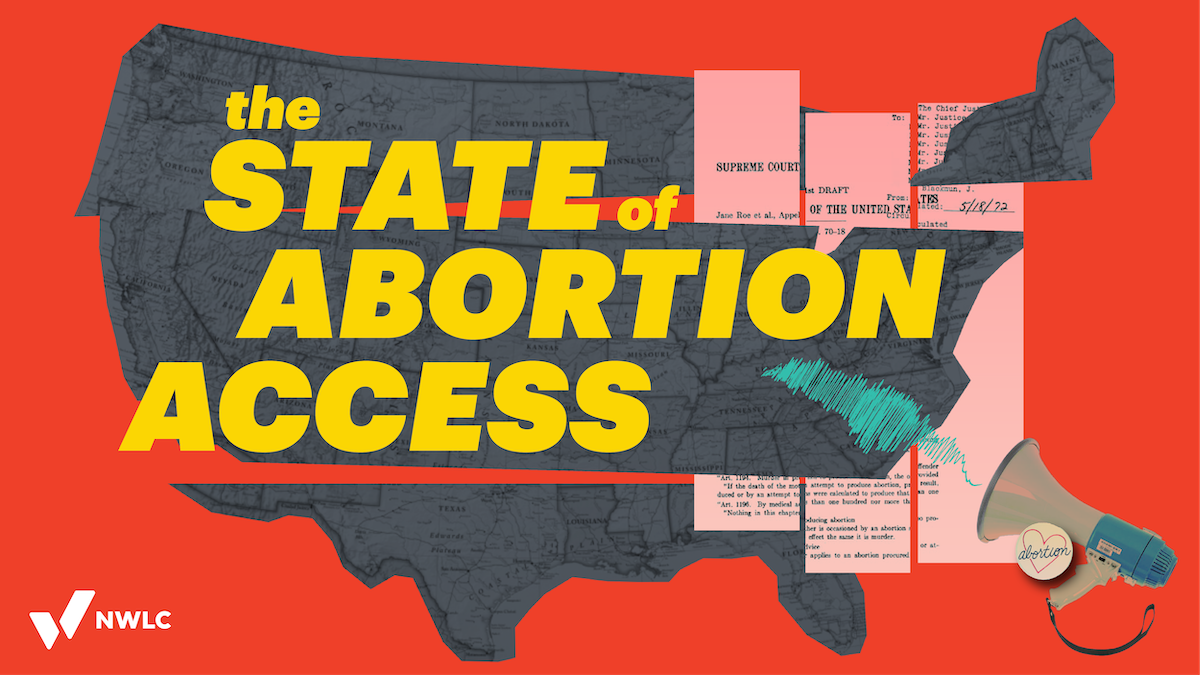Abortion rights, women of color, and LGBTQIA+ people are under attack. Pledge to join us in fighting for gender justice.
Introducing The State of Abortion: Your Biweekly Update on Abortion Access in the States

As you might have heard, the Supreme Court is currently considering overturning the constitutional right to abortion recognized by Roe v. Wade. The Supreme Court case that could gut or overturn our right to abortion arose out of a horrible Mississippi law that bans abortion after 15 weeks. But while we wait for that Supreme Court decision, an onslaught of anti-abortion legislation is happening in individual states. While Roe v. Wade is still the law of the land, many state legislatures are challenging it by enacting unconstitutional laws. And the Supreme Court has not been protecting that right – instead, SCOTUS has allowed a bounty hunter abortion ban – Texas SB8 – to go into effect, emboldening other state legislatures to write and pass similar laws.
Even if you do not live in a state where these laws are being considered or passed, 1) an attack on abortion anywhere is an attack on abortion everywhere. Abortion restrictions are already putting a strain on abortion providers and clinics in states where there are fewer restrictions, putting a burden on the clinics and providers there. 2) These laws are absolutely terrifying for the people they will impact. We should all be outraged whether we feel a direct impact or not.
It’s time to discuss the State of Abortion–welcome to a biweekly update on what’s happening to abortion access in the states. We’ll talk about the good, the bad, and the really bad (which, sadly, is most news on abortion access at the moment). We’ll also talk about what you can do to help, whether you live in the affected state or not.
The bad news
Arizona
Arizona Gov. Doug Ducey (R) just signed a 15-week abortion ban into law, outlawing abortions after 15 weeks of pregnancy except for medical emergencies. The bill makes it a felony for doctors to provide abortions in violation of this law.
Florida
Florida’s 24-hour mandatory delay law is coming back from the dead, after a recent court went against the state’s constitutional right to abortion care and reinstated this medically unnecessary law that has been on the books (but blocked by court order) since 2015. Patients will have to wait at least 24 hours between in-person counseling at a health center and their abortion appointment. Florida legislators have also passed a 15-week ban and are waiting for Governor DeSantis to sign the bill into law.
Idaho
The Idaho governor just signed a ban on abortion after six weeks of pregnancy, making this the first state to pass a ban modeled after Texas’ abortion ban.
Commenting on the bill, Idaho Governor Brad Little said, “While I support the pro-life policy in this legislation, I fear the novel civil enforcement mechanism will in short order be proven both unconstitutional and unwise.” The governor stated that he feared the bill may “retraumatize” survivors of sexual assault if assailants’ family members can sue survivors for obtaining abortions.
Despite these serious implications–which the governor admitted in stating his reservations–he signed the bill into law. So… sign it now, fix it later? That seems to be the logic the governor is using as he admits his hesitations but washes his hands of responsibility.
Planned Parenthood is suing the state to block the implementation of the latest abortion ban.
Oklahoma
The Oklahoma state legislature passed a bill that would ban most abortions at any point in a pregnancy and would allow private citizens to enforce the law by suing those seeking an abortion–encouraging citizens to act as bounty hunters for the state.
This bill is even more extreme than Texas’ abortion ban–the Oklahoma ban would start immediately after conception if the abortion didn’t meet an exception written into law. Exceptions would be “to save the life of a pregnant woman in a medical emergency” or if the pregnancy was the “result of rape, sexual assault, or incest that has been reported to law enforcement.”
South Dakota
South Dakota Gov. Kristi Noem on Wednesday signed a law that further restricts access to abortions through medication in the state. The measure will NOT take effect immediately, due to a pending federal court case.
Though the law in South Dakota has yet to take effect, the ideas circulated in bills that have not been passed are still chilling. Legislators who clearly do not understand the science of reproductive health are creating a hostile environment not only in their state, but in the country, as they embolden other legislators to attempt to pass similar laws.
The good news
California
Abortion services will now be fully covered by insurance in California by law. Gov. Newsom signed the “Abortion Accessibility Act” into law, which eliminates all out-of-pocket costs for patients with private insurance.
Colorado
Colorado state legislators passed a bill protecting the right to abortion. It’s now awaiting the governor’s signature. If Roe v. Wade is overturned or weakened, Colorado is preparing to become a kind of “sanctuary state” for people seeking abortions.
To be clear, “sanctuary states” are in no way a replacement for accessible reproductive care–and in fact are inaccessible to those who cannot afford to travel or take off work. For so many people traveling to seek abortion care is simply not an option.
What you can do
Donate to these abortion funds:
Abortion Fund of Arizona: Donate here
Northwest Abortion Access Fund: Donate here
Roe Fund: Donate here
Florida Access Network: Donate here
You can also volunteer for your state’s abortion fund:
Abortion Fund of Arizona: Volunteer here
Northwest Abortion Access Fund: Volunteer here
Florida Access Network: Volunteer here
WARNING: While looking up abortion funds in these states to donate to, the first options when typing in “[state] abortion fund” were crisis pregnancy centers. Crisis pregnancy centers position themselves as places people can go to receive information or help with reproductive health care, but instead mislead or delay them with false information around pregnancy and abortion and manipulate them out of an abortion. Keep in mind these were the first results when I was doing research, and it took me a few reads to determine that these centers were not legitimate options for abortion.
Imagine being a pregnant person, unable to turn to anyone in your state for fear of implicating them in a lawsuit, and that’s your first google result when you want to obtain an abortion. We all need to be wary of these CPCs as we support abortion funds and individuals seeking reproductive health care.





